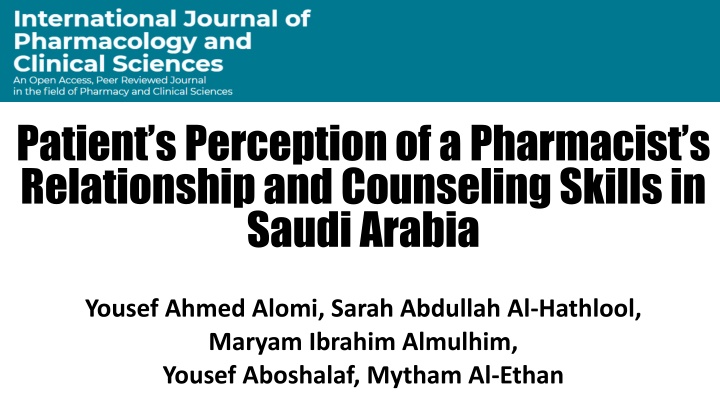
Patient Perception of Pharmacist Relationship & Counseling Skills in Saudi Arabia Study
Explore how patients in Saudi Arabia perceive pharmacists' communication and counseling skills, highlighting areas for improvement such as privacy, contact facilities, and drug-related problem instructions.
Download Presentation

Please find below an Image/Link to download the presentation.
The content on the website is provided AS IS for your information and personal use only. It may not be sold, licensed, or shared on other websites without obtaining consent from the author. If you encounter any issues during the download, it is possible that the publisher has removed the file from their server.
You are allowed to download the files provided on this website for personal or commercial use, subject to the condition that they are used lawfully. All files are the property of their respective owners.
The content on the website is provided AS IS for your information and personal use only. It may not be sold, licensed, or shared on other websites without obtaining consent from the author.
E N D
Presentation Transcript
Patients Perception of a Pharmacists Relationship and Counseling Skills in Saudi Arabia Yousef Ahmed Alomi, Sarah Abdullah Al-Hathlool, Maryam Ibrahim Almulhim, Yousef Aboshalaf, Mytham Al-Ethan
ABSTRACT ABSTRACT: : Purpose Purpose: : To explore the patient s perception of a pharmacist s relationship and counseling skills in Saudi Arabia. Methods Methods: : This is a 4-month cross-sectional survey of the patient s perception of the pharmacist. The survey consisted of two part: the first part gathers demographic information and the second part contains 49 questions divided into four domains: (1) the first domain captures data regarding the patient s general perception about the pharmacist; (2) the second domain captures data regarding the patient s perception of pharmaceutical services; (3) the third domain was regarding the patient s perception of visiting ambulatory care; and (4) the fourth domain captures the data regarding the patient s perception of pharmacist s relationship and counseling skills. We used the 5- point Likert response scale system to obtain responses of the participants. There were open- and close-ended questions. The survey was distributed through social media at a 500-bed general hospital in Alhassa region, at an ambulatory care pharmacy. The authors interviewed the patients with an electronic survey documentation. The survey was distributed in an electronic format. In this study, we analyzed domain four, that is, about the patient s perception of pharmacist s relationship and counseling skills through Survey Monkey system.
Results Results: : A total of 617 patients responded to the survey. Of them, 536 (87.7%) were Saudi and 75 (12.3%) were non-Saudi nationals. There were 457 (74.1%) female and 160 (25.9%) male responders. Most of the patients (222 (36%)) visited the pharmacy more than 10 times in the past 12 months, whereas the others (122 (19.8%)) visited the pharmacy at least 5 9 times. Most of the patients (481 (83.5%)) spent less than 11 min with the pharmacist. The average score of patient perception of a pharmacist with communication and relationship skills was 3.66. The following statements received highest scores: the pharmacist politely delivers the medication (4.09) and the pharmacist answers the questions in an excellent way (3.87). The statement with lowest score was communication with pharmacy by phone at any time (3.04) (Table 2). The average score of patient s perceptions of pharmacists with medications counseling skills was 3.6. The statement with highest score was all the medications received were packed (4.35) and the patient understands what the pharmacist was saying (4.1). The statement with lowest score was the pharmacist provides you information about the proper storage of your medication (3.04) and the pharmacist explains all the possible side effects (3.12). The statements with highest scores of patient relationship with drug information centers were the pharmacist answers patient s question through drug information center s hospital over 24/7 (3.44) and poisonous cases first contact the national drug information center or any hospital drug information center any time through MOH hotline 937 over 24/7 (3.37).
Conclusion Conclusion: : Patient s perception toward pharmacist s communication and counseling skills need to improve with an emphasis on patient s privacy, contacting facilities and instructions to drug-related problems. Improvement of patient demand will raise patient s perceptions and avoid the unnecessary additional cost.
CONCLUSION CONCLUSION The patient s perception of the pharmacist related to his communication, relationship and patient counseling skills was found to be acceptable including the MOH hotline of answering drug information inquiries. This is the first study conducted in the Kingdom of Saudi Arabia. We intend to conduct an in-depth research about the topic in our future studies.
